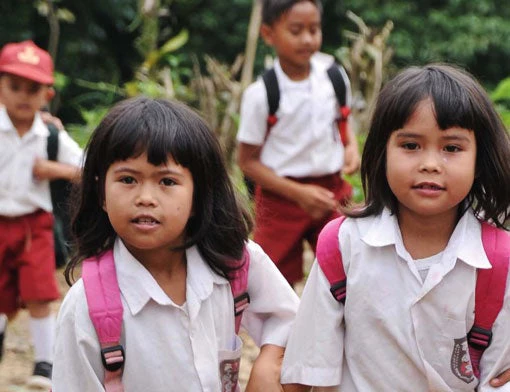This year, Indonesia celebrates the first decade of its school grant scheme BOS (Bantuan Operasional Sekolah). The program aims to ensure that schools have sufficient funds to operate, reduce the education costs faced by households and improve school based management. The program is huge and covers approximately 43 million primary and secondary school students across Indonesia. Every year, schools receive $50 for each primary and $60 for each junior secondary school student[1]. This translates into an annual grant of about $20,000 for the average junior secondary school.
Since I arrived in Indonesia we have visited schools regularly to check on the progress of BOS. I have talked with poor parents about how the program has helped to lower the education costs they face. School Principals have shared with me the many ways BOS has enabled them to provide the training opportunities their teachers need to improve classroom practice. School visits have also highlighted some of the challenges the program has faced in ensuring funds are used transparently. In one school, the necessary public noticeboard displaying information on the use of BOS funds was pulled out from behind a cupboard and contained information that was a year out of date.
While they are always informative it is never clear how widespread the findings from a handful of school visits really are. In order to get a better picture of whether the program had met its objectives we recently set about analyzing nationally representative data relevant to the BOS program.
Our findings, summarized in a recently issued report, show that discretionary funding at the school level increased considerably when the BOS program was introduced. At the same time, schools reduced fees and charges which in turn lowered education costs particularly for poor parents. However, the drop was short lived and education costs are higher now than they have ever been. Perhaps unsurprisingly, the effect of the program on increasing participation rates has been relatively limited although there is some evidence that it contributed to a narrowing of the wealth gap in junior secondary enrolment rates.
The report also found that the extent to which increased school funding translated into better education outcomes depends critically on the quality of management at the school level. The BOS program was designed to support school based management reforms by ensuring a central role for school committees in the oversight of BOS fund usage and introducing a number of initiatives to increase the transparency of school funding decisions. While almost all schools have established school committees and follow centrally prescribed management processes, it is not clear that these have so far led to better education outcomes.
So what can be done to improve the effectiveness of the program? Since the program was introduced the major challenge facing the Indonesian education system has shifted from improving access to improving quality. The BOS program could play a really useful role in supporting this shift to a great focus on quality through, for example linking BOS funding more directly to education standards and existing accreditation procedures.
Ensuring that poor children have access to good quality basic education opportunities remains a key government objective. However, BOS allocation rules often end up giving less to schools serving poor and remote communities. Introducing adjustments to the formula to eliminate these disparities would be an important first step in making the program more equitable. A further step could usefully draw from the experience of other countries and give more funds to schools that serve disadvantaged students so that they can provide the additional support these children need.
Ultimately, the success of the program will depend on how well BOS funds are used to improve education outcomes. Building the capacity of school principals to plan and manage school improvement will be crucial to achieve this. But it will also require strengthening existing mechanisms to hold schools accountable by for example reassessing the role and representativeness of school committees.
Many countries are facing similar education challenges as Indonesia and the lessons from the first 10 years of the BOS program are likely to be useful as governments across the region seek to strengthen their own programs. Indonesia could also learn from other countries, both developing and developed, on how to adapt BOS to improve education spending efficiency further and play an even stronger role in raising the education outcomes of all Indonesia’s children.



Join the Conversation